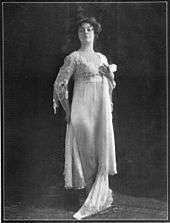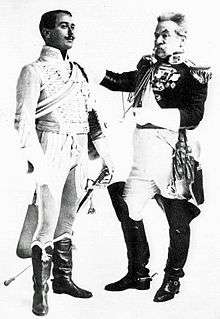Les P'tites Michu
| André Messager |
|---|
 |
|
Operas
|
Les p'tites Michu is an opérette in three acts, composed by André Messager. The libretto was by Albert Vanloo and Georges Duval. It has been produced in English under the title The Little Michus.
Dismayed by the Paris reception for his 1896 piece, Le Chevalier d’Harmental, Messager retreated to London vowing to write no more. But when he received the libretto for Les p'tites Michu in 1897 from Vanloo and Duval, he was inspired to finish the new operetta in three months. Encouraged by this success, the same team produced Messager's most successful operetta, Véronique, in 1898.[1]
Performance history

The first performance was at the Théâtre des Bouffes Parisiens, Paris, on 16 November 1897, starring Odette Dulac in one of the title roles, with the production running for over 150 performances. A revival at the same theatre in 1899 starred Mariette Sully and Jean Périer.[2]
Vienna first saw the operetta on 16 September 1899 at the Carltheater.[3]
The piece enjoyed a long run in London under the title The Little Michus. The English adaptation was by Henry Hamilton, with lyrics by Percy Greenbank, and was produced at Daly's Theatre, opening on 29 April 1905 and running for 401 performances. The London production starred Adrienne Augarde and Mabel Green, with Robert Evett, Willie Edouin, Huntley Wright, Amy Augarde, Willie Warde, Ambrose Manning, Louis Bradfield, Lily Elsie, and the dancer Adeline Genée.[4] Later, Henry Lytton joined the cast, replacing Bradfield.[5] A bit of comic business introduced during the London run of the show involved a fictional animal called the Gazeka, which became a London fad.
The Little Michus had a Broadway run in 1907 and was an international hit, continuing to be revived thereafter.
Synopsis
In 1793, the wife of the Marquis des Ifs dies in childbirth. The Marquis, before disappearing to evade arrest, entrusts the infant girl to the Michus, paying the family a sum of money that allows them to open a prosperous shop. The Michus have a daughter of their own. While bathing the two babies, Mr. Michu mixes them up and cannot tell which is which.

- Act I
By 1810, the girls, Blanche-Marie and Marie-Blanche have grown up together, believing themselves to be twins, and have gone to school under the military Miss Herpin. Aristide, the Michu's clerk, is in love with one of the girls but is not sure which. The Marquis des Ifs, now a general, sends Bagnolet to find his daughter, whose hand he has promised to lieutenant Gaston Rigaud, the officer who saved his life. It turns out that Gaston is Miss Herpin's nephew, and while visiting his aunt, the girls meet the handsome lieutenant, and both are enchanted. Bagnolet finds the Michus. Embarrassed at being unable to name the general's daughter, they agree to meet the general.
- Act II
The general and his guests await the arrival of his daughter. When the Michus arrive, the general is impatient with their explanation: he wants to know which girl is his daughter and will marry the lieutenant. Knowing that her sister is enamored of Gaston, Blanche-Marie decides to make a sacrifice and identifies her sister as the general's daughter.
- Act III
With a sad heart, Blanche-Marie resigns herself to marry Aristede, whom she finds exceedingly uninteresting. On the other hand, and to the astonishment of her fiancé and the Marquis, Marie-Blanche goes to help at the shop at every opportunity. She realizes that she has made a mistake: her sister loves Gaston, and she herself would prefer the common life of the shop and marriage to Aristide. The day of the double wedding, Marie-Blanche looks for a portrait of the Marquis' wife. Her idea is to dress Blanche-Marie as the late Marchionesse. The resemblance is astonishing. The Marquis believes that he sees his wife: Blanche-Marie must be his daughter.
The two couples are sorted out and all ends happily.
Roles

| Role | Voice type | Premiere Cast, 16 November 1897 (Conductor: André Messager) |
|---|---|---|
| Général des Ifs | bass | Barral |
| Michu | baritone | Paul Regnard |
| Aristide | tenor | Maurice Lamy |
| Bagnolet | tenor | Brunais |
| Gaston Rigaud | baritone | Henri Marchand |
| Marie-Blanche | soprano | Alice Bonheur |
| Blanche-Marie | soprano | Odette Dulac |
| Mlle Herpin | mezzo-soprano | Léonie Laporte |
| Madame Michu | soprano | Vigouroux |
| Madame Rousselin | soprano | Lérys |
| Madame Saint-Phar | soprano | Yrven |
Musical numbers (English adaptation)
- Overture
Act I - The Playground of Mlle. Herpin's School in Paris - circa 1810
- No. 1 - Chorus - "We are little schoolgirls, and of course we have to do ev'ry single thing that our headmistress..."
- No. 2 - Marie-Blanche & Blanche-Marie - "Two little maids so very devoted you seldom are likely to see"
- No. 3 - Irma - "Father had three horses of his very, very own, a black one and a white one and a grey"
- No. 4 - Gaston - "If I were King and you were Queen, and this our first and formal meeting"
- No. 5 - Marie-Blanche, Blanche-Marie & Gaston - "Michu! Michu! Michu! It's the family surname"
- No. 5a - Entrance of Soldiers
- No. 6 - Gaston and Chorus - "Oh! many a gallant corps today is fighting for our glorious France"

- No. 7 - Marie-Blanche - "When I meet a man like that, with a fascinating way"
- No. 8 - Michu, Mme. Michu & Aristide - "So elegantly dress'd in all our Sunday best"
- No. 9 - Blanche-Marie, Marie-Blanche, Mme. & M. Michu, & Pupils - "Our fairy god-mamma is here"
- No. 10 - Aristide - "Oh, Marie-Blanche is so petite, she's just the very girl for me"
- No. 11 - Bagnolet - "Now, little girls, attention please, we will at once begin"
- No. 12 - Finale Act I - "Your mistress we would like, my dears, to see; we've news that will surprise her"
Act II - Salon at General Des Ifs
- No. 13 - Chorus and Mme. du Tertre - "We have come from far and near" & "Once there was a tiny baby"
- No. 14 - Gaston - "How very like children we all of us are, whom no one seems able to teach"
- No. 15 - Blanche-Marie, Marie-Blanche, Michu, Mme. Michu, & Bagnolet - "Hop o' my Thumb."
- No. 16 - Marie-Blanche & Blanche-Marie - "Oh dear, oh dear! Oh dear, oh dear! We have made a mistake somehow"
- No. 17 - Marie-Blanche & Blanche-Marie - "Saint Valentine, we know you are clever"
- Nos. 18 & 18a - Marie-Blanche, Blanche-Marie & Gaston - "So you'll wed the General's daughter!"
- No. 19 - Finale Act II - "Captain, come here! and I now will present you, so look after your P's and Q's!"
Act III - Michu's Shop, Les Halles
- No. 20 - Chorus - "Customers we, who want to buy! If you can sell us what we need"
- No. 21 - Aristide - "Strange how the unexpected should always come to pass"
- No. 22 - Bagnolet - "A woman and a soldier are the same, if you take the trouble to compare"
- No. 23 - Blanche-Marie - "Little Sister, I am getting discontented"
- No. 24 - Chorus and Mme. Michu - "Good luck to both the little brides; health, wealth and happiness besides"
- No. 25 - Blanche-Marie & Gaston - "Monsieur Gaston, believe me pray, I'm full of joyful expectation"
- No. 26 - Marie-Blanche, Blanche-Marie, Mme. Michu, Gaston, Aristide & Michu - "Now please sit down!"
- No. 27 - Finale Act III - "Two little maids will soon be united to husbands they love and adore"
The Gazeka
George Graves replaced Willie Edouin as General des Ifs, and in 1905 he introduced a bit of by-play involving a fictional and comical-looking cryptid called the Gazeka, also known as Monckton's Gazeka or the Papuan Devil-Pig, an animal said to have been seen on Papua New Guinea.
The Gazeka became a fad of the season, and a competition was mounted to encourage artists to make sketches of what the beast might look like. Charles Folkard won the competition, and the Gazeka appeared in the form of items like novelty jewellery and was taken up by Perrier, the sparkling water makers, for a series of advertisements. The Gazeka also featured in a special song and dance in the entertainment Akezag, at the London Hippodrome at Christmas, 1905.[6]
Notes
- ↑ French site with information about the operetta, including background, synopsis, cast and discography
- ↑ Gänzl, Kurt and Andrew Lamb. Gänzl's Book of the Musical Theatre. The Bodley Head, London, 1988.
- ↑ Loewenberg A. Annals of Opera. London, John Calder, 1978.
- ↑ The Play Pictorial, vol. 6, pp. 29–56, Greening & Co., Ltd., 1905, accessed 11 December 2009
- ↑ Jones, Brian. Lytton: Gilbert and Sullivan's Jester (2006), p. 106
- ↑ Gazeka and Graves in The Little Michus at John Culme's Footlight Notes.
References
- The Play Pictorial, Vol. 6 No. 35, London, June 1905, pp. 29–56. Includes illustrations of the London production, the cast and sets. Two musical numbers are printed.Description online here.
- An old postcard, on an Australia local government website
External links
- Song list with links to Midi files and London cast list
- Information about the Broadway run
- Photo of Genee in The Little Michus
- Information about The Little Michus and other shows opening in London in 1905